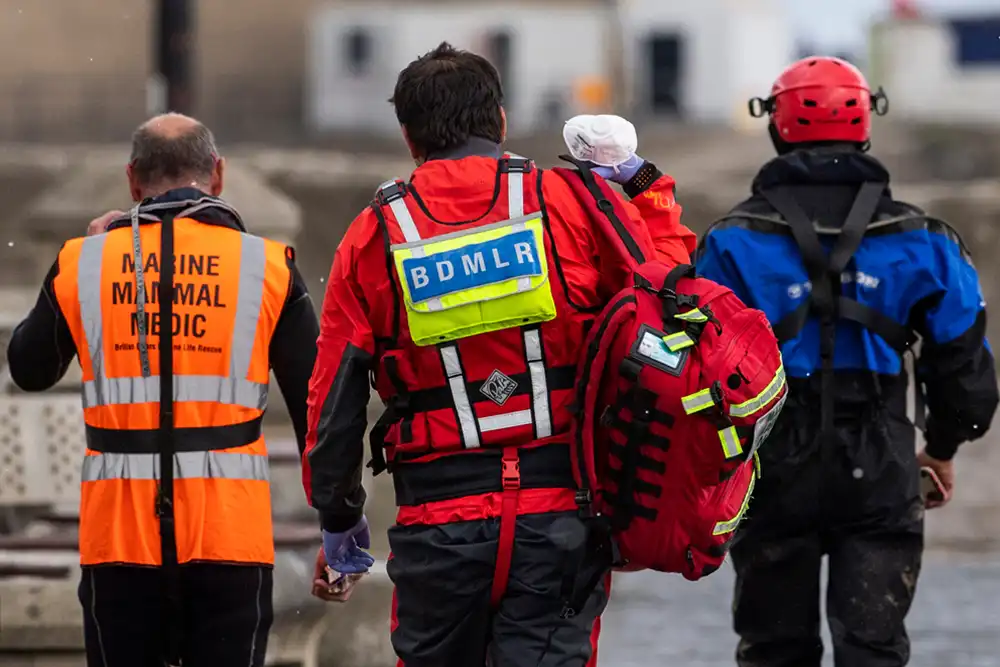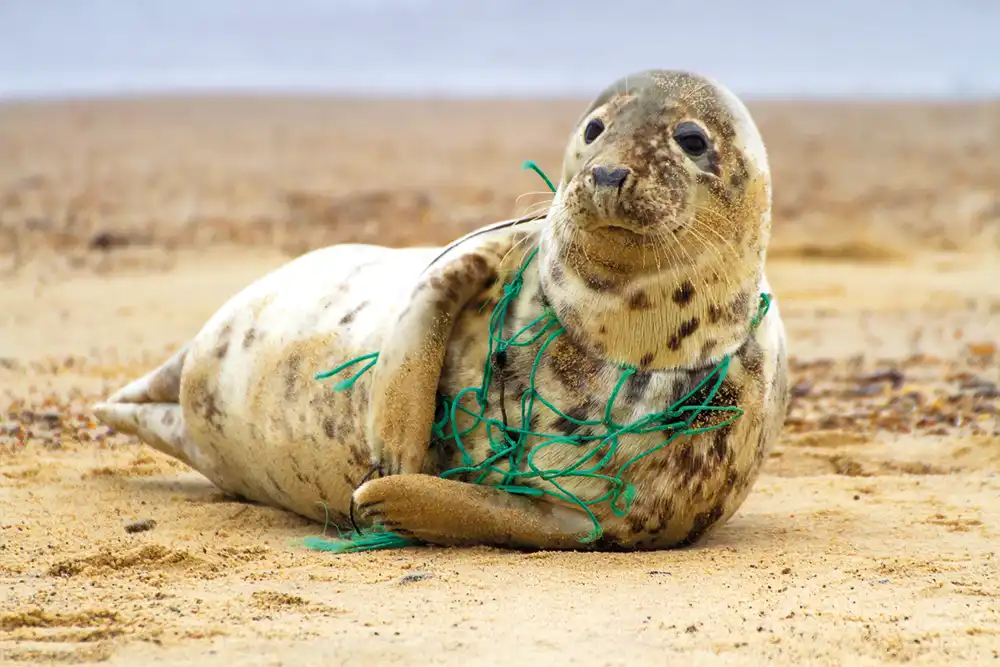
Musician, author and now a British Divers Marine Life Rescue volunteer, Ross Merrin talks to Mark ‘Crowley’ Russell about the serious fun of learning how to help stranded marine mammals
The worst of the British storm season is usually during autumn and winter, which coincides with pupping season for the islands’ seal populations. Even the hardiest of adult seals can be seriously injured by the battering of waves against the rocks, and vulnerable newborn pups are subjected to immense forces from which they simply have no escape.
During Storm Darragh, which hit the UK over the weekend of 6-8 December last year, volunteer Marine Mammal Medics from the British Divers Marine Life Rescue (BDMLR) attended more than 65 callouts. Many were for newborn grey seal pups that had become separated from their mothers; gravely injured by the storm and malnourished from missed feeding.
To put that figure into context, callouts since the start of the pupping season in early August last year have now topped 500, and the season is far from finished.

The BDMLR was originally formed in 1988 in response to an outbreak of phocine distemper virus (PDV, or Phocine morbillivirus), which killed as many as 18,000 harbour seals (also known as common seals) and some 300 grey seals around the coastlines of Northern Europe.
Over the years, the charity has taken on a broader responsibility encompassing the rescue of cetaceans, as well as seals, that have become stranded or entangled. Many of its efforts do not make national headlines, but BDMLR’s website and social media pages are awash with incidents – from seals that fishing line entanglements have almost decapitated to beached dolphins and the mass stranding of 77 pilot whales on the island of Orkney in July 2024.
Each year, the charity trains up to 1,000 volunteers to assist with the rescue of marine mammals (and the occasional turtle). Although it bestows the title of Marine Mammal Medic on its attendees, no prior experience or veterinary training is required – anybody aged 18 and over can apply, and the only real prerequisites are to be reasonably fit and to own a wetsuit or drysuit and appropriate footwear for navigating Britain’s rocky coastline.
One of BDMLR’s newest Marine Mammal Medics is Ross Merrin, a classically trained musician, guitar tutor and author of the recently published contemporary fiction How Beats the Original Heart. His current home in the leafy suburbs of North London is some distance from the coast, but Merrin was raised in Anglesey, the small island at the western tip of North Wales and often – as with Storm Darragh – the first port of call for violent weather systems pouring in from the Atlantic.
An experienced diver with more than 250 dives and a Rescue Diver qualification under his weight belt, Merrin has dived around the world for the better part of 20 years, recent developments in his personal circumstances sparked a desire to seek a new and more rewarding challenge.

‘Something happened professionally that meant I was, financially, a little freer,’ he said when we spoke. ‘And I thought, I’ve done very well here – and this sounds bit cringy – but how can this benefit other things? I’m in a good place. How can that be paid forward?
Asked as to why he chose the BDMLR in particular, he said, ‘It combines a lot of things that I’m genuinely interested in. The formative years of my life were spent right next to the sea, and the sea occupies your daily life when you live right next to it, so nowadays the idea of getting into the car and driving out to the Norfolk coast was really not a problem.’
The training itself was – in the same way that Rescue Diver courses are marketed – ‘serious fun’. Just like every layperson’s first encounter with Annie the resuscitation doll, there were giggles among the assembled trainees when ‘the inflatable whale’ (actually a heavily weighted dummy) was first introduced, but then it was down to the serious work of learning to save animal lives.
‘With the seals, for example, they have a heavily weighted doll,’ says Merrin, ‘and they will teach you first of all how not to scare the seal; how you can subdue the seal without harming it; working as a pair to protect its eyes and keeping the panic down while making observations and taking notes.’
Although the training deals with handling injured and panicked animals, new recruits are not expected to approach a rescue unaided, instead observing the animal and working to control the scene, keeping members of the public and their dogs at bay, and feeding information about the animal’s location and condition back to BDMLR HQ, which will then be passed on to the attending veterinarian.
‘They give you a briefing on each individual animal, so you might see simple things that I’d never known before,’ says Merrin. ‘To spot the nature of the eyes of the seal, for example, to see whether it is dehydrated or malnourished, or how much puppy fat they have.
‘You’re well informed on what might be a healthy seal and what might not be.’
Merrin speaks highly of the ‘very professional’ and extremely knowledgeable BDMLR staff running the programme, which on the day he attended was enjoyed by a group of around 60 people from a mix of backgrounds and ages ranging from early 20s to over 50.

Anybody with an interest in marine life can sign up to the course, and the charity is always keen to recruit new volunteers.
‘With a network of around 3000 volunteers across the UK, we are always in need of new Medics as callouts to help marine mammals are increasing year on year,’ said Susan Tierney, Engagement Officer at the BDMLR.
‘It is hugely important that we respond to a changing marine environment where human influence is affecting marine mammals. Therefore we would urge anyone who wants to help to attend one of our courses, to be there for marine mammals when they need us.’
It is early days for the new Marine Mammal Medic, but Merrin is enthusiastic about his role in the future, while acknowledging the skill and dedication of the BDMLR’s experienced medics and vets.
‘I’m really glad that I got involved’ says Merrin. ‘I’m hoping to I can make a difference, but the BDMLR people involved were really impressive; they’re obviously very committed.
It’s one thing being a London-based volunteer – and I’m going to go and contribute whenever they need me – but some of these guys are out in the middle of storm-swept Scotland somewhere, you know, they’re just absolutely committed to this, so, hats off to them.’
BDMLR Marine Mammal Medic Courses cost £115 and are held at various locations around the UK between March and October each year. For more information, head to bdmlr.org.uk. Ross Merrin can be found at www.rossmerrin.com
More great reads from our Magazine
- Shark and Jolanda Reef – Howard Rosenstein on the day it all began…
- ‘Toxic Trumps’ – venomous sea creatures and how to treat their stings
- An Island of Hope – St Helena’s extensive MPA
- 52 Assignments: Underwater Photography with Alex Mustard
- Are work-for-training scuba diving internships worth it?
- New shark-repellent hook could cut longline bycatch by more than 60 per cent - 17 February 2026
- Perth dive operator fined after leaving divers behind - 16 February 2026
- Aggressor Adventures announces upgraded Red Sea Aggressor IV - 13 February 2026



